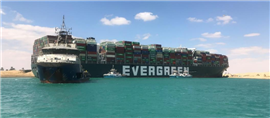Conflict in Red Sea inflating shipping rates
15 January 2024
Despite improving sentiment on inflation and material price improvements, conflict abroad could make for an uneven start to 2024
 A commercial ship navigates the Suez Canal. Attacks by Yemen Houthi groups have caused shipping companies to use longer routes outside the Red Sea.
A commercial ship navigates the Suez Canal. Attacks by Yemen Houthi groups have caused shipping companies to use longer routes outside the Red Sea.
Construction input prices decreased 0.6% in December compared to the previous month, according to ABC’s (Associated Builders and Contractors) analysis of US Bureau of Labor Statistics’ Producer Price Index.
Non-residential construction input prices decreased 0.4% for the month.
“Construction input prices fell sharply in December,” confirm Anirban Basu, ABC chief economist. “While plunging oil prices are the primary factor behind the sharp decline, most input prices were tame in 2023’s final month. That serves as a fitting end to a year during which aggregate input prices increased just 1.2% and many individual commodity prices actually fell.”
Crude petroleum input prices were down 13.2%, while unprocessed energy materials were down 9.1%. Natural gas prices rose 1.5% in December.
Overall construction input prices are 1.2% higher than a year ago, while non-residential construction input prices are 1.6% higher.
Basu said that – despite improving sentiment on inflation and material price improvements – conflict abroad could make for an uneven start to 2024.
“Piracy in the Red Sea and the resulting diversion of ships from the Suez Canal around the Cape of Good Hope has caused global freight rates to nearly double in the first two weeks of 2024, according to the Freightos Baltic Index,” said Basu. “Rising shipping costs will put upward pressure on certain inputs.”
Since December, global media have reported attacks – at the Red Sea’s southern end – on commercial ships launched by Yemen’s Houthi group. The risk of piracy has caused shipping companies to avoid the route, which involves utilisation of Egypt’s Suez Canal on the Red Sea’s northern end.
The issue has escalated into the new year, as media reports of US and UK-led missile strikes on Houthi targets surfaced on 11 January.
US President Joe Biden told media the strikes were ordered, “in direct response to unprecedented Houthi attacks against international maritime vessels in the Red Sea.”
British Prime Minister Rishi Sunak noted it was act of self-defence. Sunak said the goal was to “de-escalate tensions and to restore stability to the region.”
By 12 January, press reported the Houthi’s Supreme Political Council pledged to continue targeting ships, and noted “all American-British interests have become legitimate targets.”
Interest rates in the States
Domestically, the industry will keep a keen eye on interest rates, as US consumer prices rose 3.4% in December 2023 compared to 2022, according to a recent report by the US Bureau of Labor Statistics.
The increase is likely to further quell some early-year optimism in the construction industry, as the US Federal Reserve’s plan to reduce interest rates in 2024 may be altered by continued rising inflation.
STAY CONNECTED



Receive the information you need when you need it through our world-leading magazines, newsletters and daily briefings.
CONNECT WITH THE TEAM








